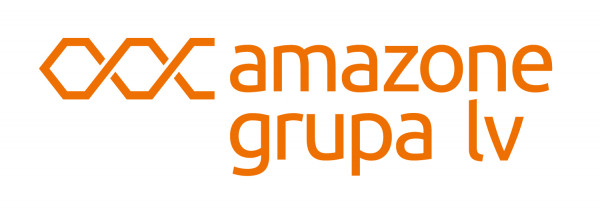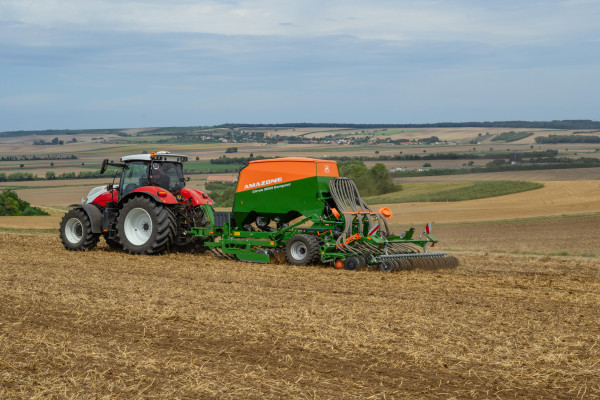Amazone: Farmers provide for basic human needs
SIA Amazone offers high quality agricultural machinery, service and spare parts. SIA Amazone is the official importer of such brands as Amazone, Krone, Steyr, Grimme, Lechler, Walterscheid, as well as represents the company Mepu throughout Latvia. Amazone grupa lv unites SIA Amazone, SIA Upeskalni AB and SIA Precīzo tehnoloģiju skola. Interview with Baiba Mikāla, co-owner of Amazone grupa lv.
This year's main topic is the Covid-19 pandemic. Has it also affected agriculture?

From the farmers' point of view, the negative effects are not visible, because farmers are the ones who provide the basic human needs ‒ food. People will always need to eat to sustain life and provide energy. In addition, for us as suppliers of machinery and technology, this time is even a very productive stage, as the restriction regarding the availability of funds for the implementation of projects was removed. As a result, farmers had additional opportunities to purchase machinery. In the spring, we received a very large number of requests, which had to be delivered very quickly ‒ it was a busy time because the farmers need machinery when there is a season, not sometime later. Looking back at the company's financial year, we see that it will be significantly better than the previous one.
Is the situation stable at the moment and can you work steadily?
Yes, compared to spring, the work is steady. Of course, in the beginning, the whole of Europe was not ready for a pandemic, but people are very smart, they adapted quickly and found the right way to ensure smooth operation. We also thought about how to work during the second wave of the pandemic beforehand. Of course, we did not think that the number of people infected would be so high, but we had a strategy in place ‒ we were aware that we would have to make extraordinary decisions to ensure continued operations. Today we see that the company was morally ready for the second wave of the pandemic.
What is the current level of Latvian farmers’ interest in purchasing new machinery? Are they developing as planned, or are they more cautious?

Latvian farmers, who have entered the category when we can say that they are producers of agricultural products, have not stopped at any point in their plans related to the development of production. At the same time, we see that our farmers are also affected by European trends and attitudes towards the environment and climate. This forces farmers to adapt their farming strategy to European climate change guidelines.
Do I understand correctly, that what you are saying is about the promotion of direct sowing in conventional farming and the development of organic farming?
Yes, so we need to be knowledgeable in these areas and offer technologies that allow Latvian farmers to join European trends, both in terms of conventional agriculture and organic farming.
Direct sowing requires specialized equipment ‒ seed drills that can incorporate seeds into the soil without pre-tillage ‒ directly in the stubble or with minimal tillage.
I believe that organic farming produces niche products. It will be more of a premium class with a corresponding price in the market. If organic farming is practiced in good faith, the cost of the product produced will be significantly higher than that of conventional agricultural products. It is therefore understandable that area payments are higher for this sector.
In the context of organic farming, SIA Amazone can talk about plows and other tillage equipment that helps fight weeds.
I know that in organic farming weeds can be controlled with special ‒ biological means. Sprayers are required to apply these products to plants, just as in conventional agriculture. Taking into account the high quality of SIA Amazone sprayers, in order to ensure the maximum possible accuracy, we understand that we can definitely offer this product to organic farmers.
We are not separated from the rest of the world, and Latvian farmers are adapting the experience of European farmers both in technology and in the agrarian process itself, adapting them to the regional needs of their farms.
Why is direct sowing being promoted in terms of climate change?
All 28 years of our existence, our company has adhered to the traditional agriculture and Ulmanis wish ‒ to plow the land in autumn.
Tillage, most notably plowing, is also hard work for the tractor and consumes the most fuel, which naturally generates additional emissions.
In my opinion, farmers should analyze the potential risks and benefits before switching to direct sowing. They should consult with those farmers who are already working with this technology. It must be a gradual transition. The company Upeskalni AB of Amazone grupa lv has also decided to gradually introduce direct sowing as one of the technologies.
What are the trends ‒ are our farmers opting for direct sowing and buying specialized seed drills? Are European area payments higher if this technology is used?
In general, in the new EU planning period of 2021-2027, Latvia plans to gradually increase area payments, which have been one of the lowest in the European Union for a long time. At the same time, I would like to explain that even now, when sowing directly in stubble, area payments per hectare are 87 euros higher. In my opinion, this is a motivating factor.
Farmers are divided ‒ some see the benefits, others believe that the yield per hectare is lower.
It is clear to everyone that it is necessary to reduce emissions not only in Latvia but throughout Europe and the world, so mechanisms and regulations will certainly be created to promote emission reductions in the agricultural industry as well.
Machinery dealers see very well how agricultural sectors are changing or not. What are the observations?
We see that our farmers like experiments, and that is respectable. Opportunities are being sought to grow new crops and varieties. Of course, the tested values are preserved ‒ wheat, rape, buckwheat, beans, and peas. The world has and will need these crops as they form the raw material for the food processing industry.
It is up to us to grow these products in the right quality. I would like to emphasize that a sizable amount of production enters the common European and world markets from our small Latvia, which means that our farmers are very smart, well-educated, and know how to get the best results from one hectare.
New modern equipment costs a lot, so the involvement of banks is natural. How do banks look at farmers today?
Banks can clearly see in their numbers how farmers are doing. Our company cooperates with several banks, so I can say that the banks work as a smart partner, because they form a calculation-based dialogue with the customer.
From my experience, I can say that after two years of “force majeure” (2017 and 2018), we experienced a difficult situation throughout the Amazone grupa lv. But today I am grateful to my banker, who made us focus and play with the cards we were dealt. As a result, we have benefited.
What would you like to say to farmers at the end of the year?
May God give our people not to lose their inherent wisdom. May the leaders of our country also draw strength from the wisdom of our people!